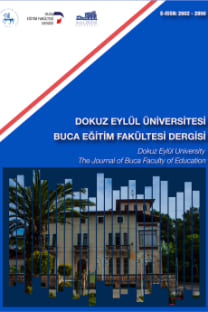Bilgisayar Destekli Kimya Öğretiminin Öğrenci Başarısı Ve Tutumuna Etkisine Bir Örnek : "Radyoaktivite"
Bu çalışmada lise-2 kimya eğitim öğretim programında yer alan Radyoaktivite konusunun bilgisayar destekli ve klasik öğretim süreçleri uygulanarak öğretilmesinin etkinliği araştırılmış ve kıyaslanmıştır. Çalışma 2002-2003 Eğitim—Öğretim yılında Ortaöğretim 10. Sınıflar üzerinde gerçekleştirilmiştir. Bu amaçla öğrencilere uygulamak için Radyoaktivite Değerlendirme Testi (RDT), Kimya Tutum Ölçeği (KTÖ) ve Bilgisayar Tutum Ölçeği (BTÖ) hazırlanmıştır. Hazırlanan bu ölçekler, oluşturulan iki deney grubu ile klasik anlattın yöntemi uygulanan kontrol grubu arasındaki karşılaştırmayı yapabilmek için kullanılmıştır. Deney gruplarından birine (DG-1), hazırlanan bir aktif öğrenme materyali kullanılarak bilgisayar destekli öğretim, diğer deney grubuna (DG-2) ise hem bilgisayar destekli öğretim hem de klasik (geleneksel) anlatım yöntemi birlikte uygulanmıştır. Araştırma sonuçları kontrol grubu öğrencilerine göre deney grubu öğrencilerinin (DG—I ve DG-2) kimya dersindeki başarılarının arttığı göstermiştir. Bu artışın DG-2 öğrencilerinde daha fazla olduğu saptanmıştır. Yani Bilgisayar Destekli yapılandırmanın klasik anlatım ile birleştirilmesinin başarı düzeyini arttırdığı bulunmuştur. Aynı sonuç öğrencilerin tutumları içinde bulunmuştur. Öğrencilerin kimya dersine ve bilgisayara karşı olan tutumlarına bakıldığında kontrol grubuna göre deney gruplarında yer alan öğrencilerdeki tutum değişikliklerinin daha anlamlı ve pozitif olduğu sonucuna ulaşılmıştır. Bunun yanında bu pozitif değişim DG-2'de daha fazla görülmüştür.
Effect of the Computer Based Chemistry Teaching on Students' Success and Attitude: Radyoactivity
In this study, the effects of teaching "Radioactivity" which takes place in high school curriculum by applying computer assisted and classical education methods were both compared and outlined. The study has been done in 2002-2003 school term. For this aim, radioactivity evaluation test (RDT), chemistry attitude scale (KTÖ), computer attitude scale (BTÖ) is prepared for applying to the students. These scales are used for, comparing the two experimental groups and control group to which was applied classical education. Computer assisted instruction is applied to one of the experimental groups (DG-1). Both computer-assisted instruction and classical education are applied to the second experimental group (DG-2). Research results displayed that experimental groups' students (DG-1, DG-2) are more successful in chemistry than the control groups' students (KG). It is seen that, there is more successful results in DG-2 students. In other words, it is seen that, the success level is increased when Computer Assisted Instruction combines with classical education. We found the same result for students' attitude. When it is looked to the students' attitudes towards chemistry and computer, the changes in students' attitudes are more meaningful and positive who are in experimental groups rather than the students who are in control group. It is seen that, there is more positive changes in DG-2
